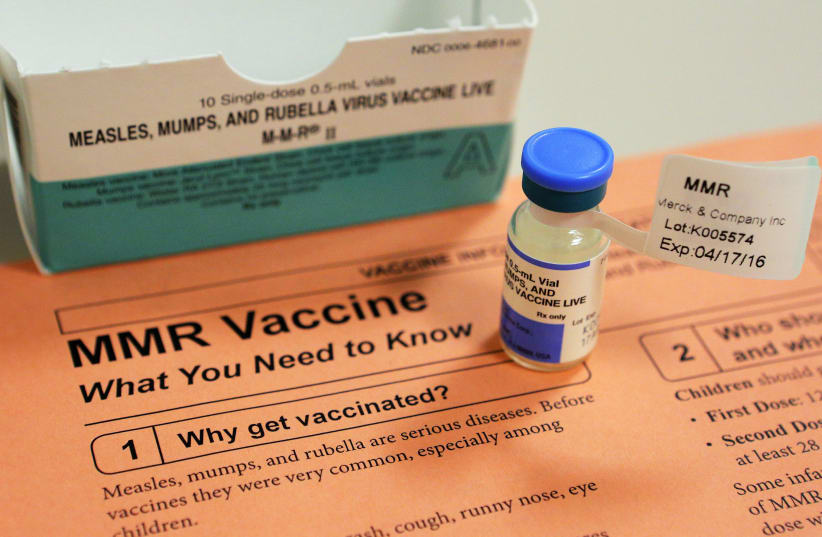The measles virus continues to spread in Israel with the latest incident affecting a Tel Aviv hospital maternity ward.
A father visiting his newborn baby last week reported coming down with measles thus potentially exposing the babies to the disease which causes fever, painful itchy rashes and red spots on the skin.The potentially fatal illness can be prevented with a vaccine, but the man told Yedioth Ahornoth news that because he was born in 1977 he only was given one shot of the vaccine as a child and not the second booster shot.
"I had no idea that I was ill or that I could expose mothers and babies," Ynet quoted him as saying.
Assuming he was safe, the Tel Aviv resident dismissed his ill health as stress related. But when he was diagnosed with measles, he immediately reported the incident. The district health bureau launched an examination and took precautionary measures.
Ichilov Medical Center, where the baby was born released a press statement which read, "five days ago, a new father stayed in the maternity ward. After being discharged, he was hospitalized in Sheba Medical Center and diagnosed with measles." The district health bureau contacted all parents of newborns in the hospital that day to issue proper treatment.
"The fact that the father and mother were in a private room like most of the mothers at Ichilov has reduced the potential exposure," the hospital added.
Today Israeli children normally receive the vaccine for MMR (measles, mumps and rubella) at 12 months of age and a second dose in first grade. But according to the Ministry of Health, those born in Israel between the years 1957 through 1977 may not have received a second inoculation and are urged to report to their local health care provider. The same advice has been issued in the United States and other countries.
The highly contagious measles virus can linger in the air for up to two hours. The painful condition in some cases required hospitalization. The disease was almost eradicated until it made a comeback in recent years.
The Health Ministry reported that "from March 2018 through the end of January 2019, as a result of the disease being imported to Israel by a small number of tourists and visitors, who later infected vaccinated population, more than 3,400 individuals have been infected with measles."
In November 2018 a one-and a half year-old baby from the Armon Hanatziv neighborhood in Jerusalem died from the disease.
Deputy Health Minister Yaakov Litzman has pushed for increased vaccination, calling for them to be a prerequisite before any child is accepted into school. Ninety percent of the cases reported in 2018 resulted from people who had not been vaccinated or came into contact with vaccinated persons, the ministry said.
Those who cannot receive the vaccine are pregnant women, children under one years of age and those suffering of severe immunosuppression.
Many blame the measles outbreak on those who refuse to vaccinate themselves or their children. The new phenomenon stems from a fear that it could cause harm.
This month New York City declared a public health emergency warning that all unvaccinated people in Brooklyn will now be required to receive the MMR vaccine or face strict penalties. The emergency was declared due to an outbreak of the disease among haredi Jews who live in the area where "anti-vaxxers" have spread false information.Haredi rabbis and medical practitioners have worked to quell the tiny group of vaccine skeptics in their community with literature in Hebrew and Yiddish and explanations that they can inadvertently infect others.
Vaccine skepticism has taken off in other insular communities as well such as the close-knit Somalian-American community of Minnesota where measles cases have skyrocketed due to the false claim it can cause autism.
The rumor had its roots with Andrew Wakefield, a former British doctor whose now debunked 1998 research paper drew a connection between the MMR vaccine and the developmental disability. His papers have since been withdrawn and retracted and his medical license revoked.
